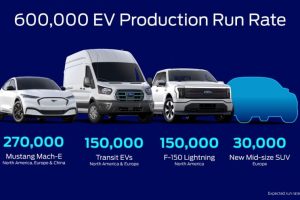Tesla (NASDAQ: TSLA) continues to maintain its position as the best-suited company moving forward following the signing of the Inflation Reduction Act, a note from Goldman Sachs said after a meeting with company executives earlier this month.
VP of Investor Relations Martin Viecha met with Goldman Sachs’ team of analysts, reiterating their $333.33 price target on the automaker’s stock following the meeting. Tesla remains in the best shape as the United States continues to push for the widespread adoption of electric vehicles, catalyzed by the recent signing of the Inflation Reduction Act by President Joe Biden. The piece of legislation sets aside billions of dollars for electric vehicle infrastructure projects, as well as the overall adoption of sustainable powertrains.
Tesla believes consumers will be more prone to consider EVs with the Inflation Reduction Act, as the benefits of buying an electric car are now substantial thanks to the reintroduction and reforming of the federal electric vehicle incentive program.
Inversely, the analysts believe the adoption of electric vehicles will be similar to how consumers started buying smartphones and LCD TVs when they first became more affordable and readily available. Of course, those two issues have inhibited consumers from getting their hands on EVs sooner than 2022. However, unforeseen supply chain issues caused by the COVID-19 pandemic disrupted component production, as well as the availability of parts, which set new vehicle order timelines back considerably while the cost of used vehicles skyrocketed to prices well above that of a new vehicle.
Despite the current situation and market conditions, Goldman Sachs still believes Tesla is the best suited for widespread EV adoption. There are several factors, including current market position, software prowess, and vehicle production ramps. Tesla is often considered the leader of electric vehicles globally, as its cars are the most tech-focused and disruptive in the recent history of the automotive sector. “Tesla, given its leadership position in EVs (including its vertical integration and tight coupling of hardware and software, as well as its ecosystem of charging stations and brand), and its focus on clean transportation more broadly (given its solar and storage businesses) is well positioned to capitalize on the long-term shift to EVs,” the analysts wrote.
Of course, the issue with Tesla currently is it is unable to produce vehicles in a timely fashion at a rate that would match its current levels of demand. CEO Elon Musk has said for years that Tesla has a supply problem and not a demand problem. The company is combating this issue with new factories in Germany and Austin, Texas, where the Model Y, its most popular vehicle, is being produced. “We expect Tesla to expand margins in the intermediate term as it ramps the important Model Y product as well as new factories in Berlin, Germany and Austin, Texas, and in the long-term as it increases its mix of software revenue.”





